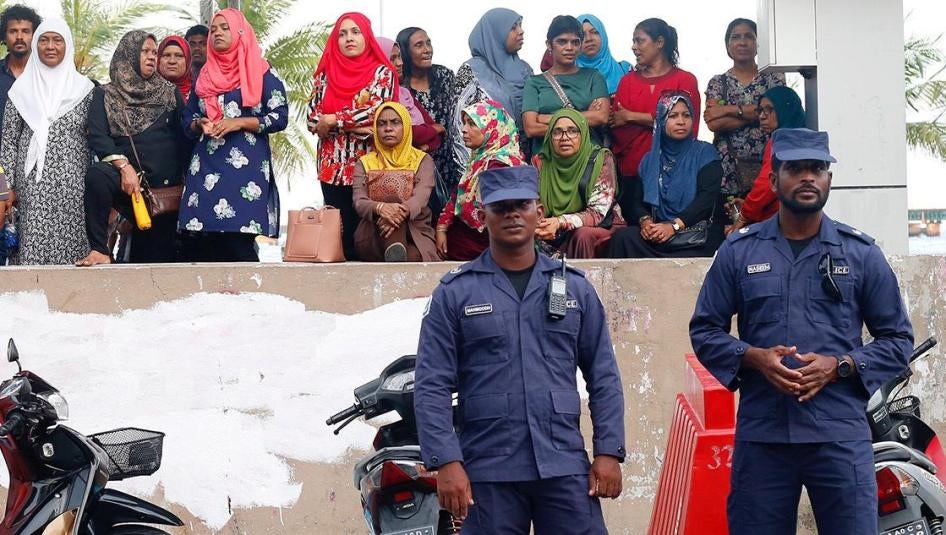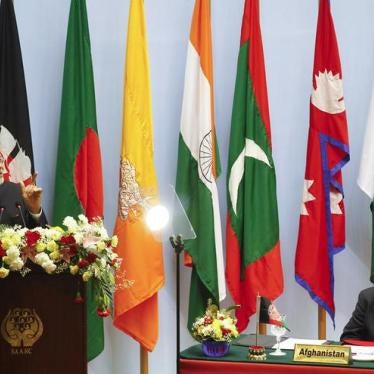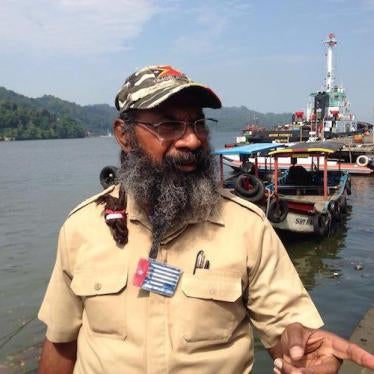(New York) – The Maldives government should immediately drop politically motivated charges against two Supreme Court justices and release them from detention, Human Rights Watch said today. On May 10, 2018, Chief Justice Abdulla Saeed and Justice Ali Hameed were sentenced to one year, seven months in prison on charges of influencing court rulings. Saeed was also sentenced to five months in prison on obstruction charges earlier this week, and both justices face additional charges of terrorism.
The judges were arrested on February 6, along with a judicial administrator and former President Abdul Gayoom, during a state of emergency declared by President Abdulla Yameen in response to a Supreme Court ruling.
“To retain his hold on power, President Yameen has used every trick in the book, from accusing political opponents of terrorism to jailing justices of the Supreme Court,” said Brad Adams, Asia director. “Donors and influential governments should send Yameen a clear message to end the attacks on fundamental rights and the country’s democratic institutions.”
The current political crisis was sparked by a Supreme Court ruling on February 1 that overturned the convictions of nine members of the opposition, including former President Mohamed Nasheed, the country’s first democratically elected leader, who had been sentenced to 13 years in prison on terrorism charges in 2015. The United Nations Human Rights Committee recently called for his release after determining that the case violated Nasheed’s rights to a fair trial and political participation under the International Covenant on Civil and Political Rights. After the Supreme Court ruling, Nasheed, who had been granted asylum in the United Kingdom, declared he would contest the presidential elections slated for September.
President Yameen denounced the ruling as “illegal,” and on February 5 declared a 15-day state of emergency “to hold these justices accountable.” The decree suspended several constitutional protections, banned public assemblies, and granted security forces sweeping powers to arrest and detain. Justices Saeed and Hameed were arrested the next day. The remaining three Supreme Court justices reversed the ruling on the opposition leaders, stating they were doing so “in light of the concerns raised by the president.”
In February, the UN high commissioner for human rights, Zeid Ra’ad Al Hussein, stated that “what is happening now is tantamount to an all-out assault on democracy.” Two UN experts said the detention of judges “is an attack on the independence of the judiciary and undermines the court’s ability to work freely and effectively.”
The government should order the release of the nine convicted opposition members, whose trials were politically motivated and in violation of their due process rights, Human Rights Watch said.
Since taking office after controversial elections in 2013, Yameen has increasingly adopted measures to stifle dissent and crack down on support for political opponents, including arbitrary arrests, harsh restrictions on peaceful protests and free speech, and threats to judicial independence.
“Sentencing judges to prison for upholding fair trial rights is the latest blow to the rule of law in the Maldives,” Adams said. “Yameen should take immediate steps to restore political freedoms and democratic rule in the country to ensure free and fair elections in September.”









